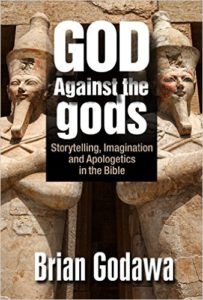Did you know that you can keep up to date with Pastor Mike’s teachings? Simply subscribe to our YouTube Channel here.
Category Archives: Theology
Scripture and the Authority of God in the 21st Century – A Response
Christian Theism and the Authority of God in the 21st Century – A Response[1]
In part one of this paper the authority of God biblically and historically was discussed. Part two looked at the authority of God in American culture from a historical perspective. Postmodernism and the implications for Christianity generally and the authority question specifically were addressed in part three. In this section the question of how Christian theism must respond to the attack upon the authority of God by 21st century mankind is taken up.
BOOK REVIEW – God Against the gods: Storytelling, Imagination and Apologetics in the Bible, by Brian Godawa
“The Christian should be the person who is alive, whose imagination absolutely boils, which moves, which produces something a bit different from God’s world because God made us to be creative.” Francis Schaeffer
Understanding the world we live in and how to live an impactful life was the crux of Francis Schaeffer’s life and work. He encouraged his generation of Christians to take their writing, art, and storytelling seriously for the glory of God as well as for the testimony of Christ. This legacy continues to inspire artists of every genre and I am pleased to say that Brian Godawa has taken up the task of exceptional storytelling, using imagination and apologetics to tell the “grandest story ever told.”
In “God Against the gods: Storytelling, Imagination, and Apologetics in the Bible,” Godawa takes aim at several lofty goals, and hits the bull’s-eye of each one. Of primary importance in this writer’s view is that Godawa states that the Bible takes a far different view of historicity than modern people do.
Godawa’s claim is that the Bible uses mythopoeic and figurative language intentionally, but that this usage in no way undermines the truthfulness or the theological accuracy of what is stated. This is an important point for modern readers who have a somewhat different understanding of what constitutes historical accuracy and even truth.
It is an impressive assertion that God never intended to satisfy the rigorous and often ridiculous demands of critics throughout the ages who would point to this passage or that statement as an example of why the Bible cannot be trusted. Instead Godawa argues that God’s inspiration of the biblical texts remains intact, having been providentially guided for His purposes, by intentionally utilizing imagery, symbolism, metaphor, and poetic figurative language much the way Jesus Christ did during His public ministry. In this way Godawa is arguing against the modernist obsession with rational abstraction and empirical observation as the only gate keepers of truth.
To make his case Godawa presents seven chapters based on articles and essays he has written that explore various topics such as:
- God’s intentional unmasking of the spiritual reality behind pagan gods.
- How Israel’s use of mythopoeic elements shared with other Near Eastern peoples can be used apologetically today.
- The biblical depiction of our universe is a theological expression of the grandeur of God and not a detailed physical or scientific expression.
- Paul’s sermon on Mars Hill is really a powerful Christian theistic worldview apologetic.
Readers will find a thorough and thought-provoking examination of such things as the true meaning behind “the host of heaven” and God’s “divine council”; of the penchant of Hollywood filmmakers to use Near Eastern mythopoeia to make blockbuster movies (hat-tip to the 2012 Marvel adaptation, The Avengers); of the necessity of understanding the Bible through a supernatural Near Eastern worldview which by the way, is very different from our own; how biblical cosmology/cosmography is not aimed toward scientific concordism, and it is a mistake to insist on that outcome; and the relationship between metaphor and prophecy especially in the eschatological genre.
In God Against the gods, Brian Godawa has provided a wonderful primer for the Christian apologist, author, and Bible student who is interested in engaging our modern world with powerful information and answers to questions commonly asked by those searching for understanding and truth.
Brian Godawa’s website – www.godawa.com
*A copy of this book was provided to me in PDF format free of charge. I received no remuneration for this review.
They Can’t All Be True
A very common bumper sticker is making the rounds these days. This bumper sticker contains one word – COEXIST. Each letter of the word coexist utilizes a different religious symbol to spell out the word. For example in some renditions the C is a crescent moon representing Islam and the T is a cross that represents Christianity. Other religions such as Hinduism, Judaism, and Taoism are also represented. The meaning is clear – all religions can and must coexist if there is to be world peace.
This idea is not new. There has been an ongoing effort for decades to find common ground among the world’s largest religious groups. What is new however is that the effort is now being publicly advocated by the United Nations as well as several so-called World Congresses that meet yearly or bi-annually to discuss strategies to unite the religions of the world into one homogeneous whole.
The first issue that I have with this thinking is that it is illogical and demonstrably false. The idea that all religious people must learn to coexist for peace to occur assumes that religious people are responsible for conditions other than peace. While it is a common refrain of the easily duped, the idea that religion has caused the most death and war is easily refuted.
Joseph Stalin of Russia and Mao Tse-tung of China are responsible for nearly 125 million deaths of their own citizens.* We don’t even need to take into consideration other despots, tyrants, and dictators throughout history that easily dwarf any deaths caused by religious fanatics.
A second issue that the COEXIST mentality overlooks is this – How do you convince people who believe in diametrically opposite religious principles to forsake those? The clear answer is by coercion. That means that if the current trend of COEXIST manipulation continues you can expect to see various attempts to pass laws that drastically curtail religious expression. We are seeing this strategy being employed today in America, aimed specifically at Christianity.
A third issue with the misguided COEXIST philosophy is that advocates believe that the creation of a religious utopia will result in a global political utopia. Again, the primary cause of wars, crime, and evil generally speaking is not religion. It is the unregenerate heart of sinful man that refuses to acknowledge the Creator.
Finally, the thinking that supports a COEXIST theology ignores the impossibility of the task. In order for all religions to coexist peacefully, the primary points of difference will need to be removed completely. No other religious system teaches a personal God who came to earth and died for the sins of mankind. For Christians this means that the teaching that there is salvation in no other name but Jesus Christ will need to be denied. That is the definition of apostasy and will never happen for true believers.
Friends, do not buy into the dream of the religious Utopians. That path leads to death. Stand firm in the Lord Jesus Christ and continue to proclaim the good news of salvation in Him alone. That is a transforming truth.
*Mao is responsible for nearly 65 million murders of Chinese citizens click here for resource.
*Stalin is responsible for nearly 60 million murders of Russian citizens. Click here for resource.
Scripture and the Authority of God in the 21st Century – Part 3
The Current Cultural Climate and Authority – A Postmodern View
The seeds of the aforementioned Enlightment period eventually gave birth to philosophies that questioned among other things the right of any one individual or nation to define such notions as truth and morality. Some recent philosophical systems aggressively attack the notion of authority. Postmodernists for instance teach that objective standards, morals, and truth cannot exist beyond cultures since they are culturally derived, and are doubtful that they can exist beyond any individually held truth.




